2018-2019学年江苏省高一模拟选课调考英语试卷Word版含答案
- 格式:pdf
- 大小:78.43 KB
- 文档页数:11
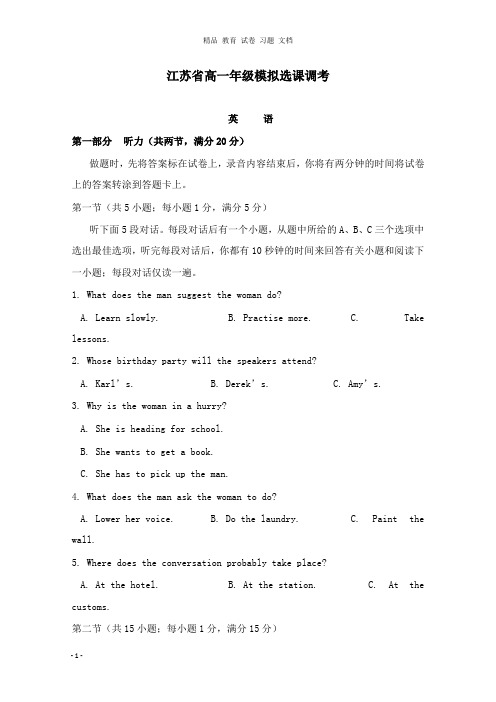
江苏省高一年级模拟选课调考英语第一部分听力(共两节,满分20分)做题时,先将答案标在试卷上,录音内容结束后,你将有两分钟的时间将试卷上的答案转涂到答题卡上。
第一节(共5小题;每小题1分,满分5分)听下面5段对话。
每段对话后有一个小题,从题中所给的A、B、C三个选项中选出最佳选项,听完每段对话后,你都有10秒钟的时间来回答有关小题和阅读下一小题;每段对话仅读一遍。
1. What does the man suggest the woman do?A. Learn slowly.B. Practise more.C. Take lessons.2. Whose birthday party will the speakers attend?A. Karl’s.B. Derek’s.C. Amy’s.3. Why is the woman in a hurry?A. She is heading for school.B. She wants to get a book.C. She has to pick up the man.4. What does the man ask the woman to do?A. Lower her voice.B. Do the laundry.C. Paint the wall.5. Where does the conversation probably take place?A. At the hotel.B. At the station.C. At the customs.第二节(共15小题;每小题1分,满分15分)听下面5段对话或独白。
每段对话或独白后有几个小题,从题中所给的A、B、C三个选项中选出最佳选项。
听每段对话或独白前,你将有时间阅读各个小题,每小题5秒钟;听完后,各小题将给出5秒钟的作答时间。
每段对话或独白读两遍。
听第6段材料,回答第6、7题。
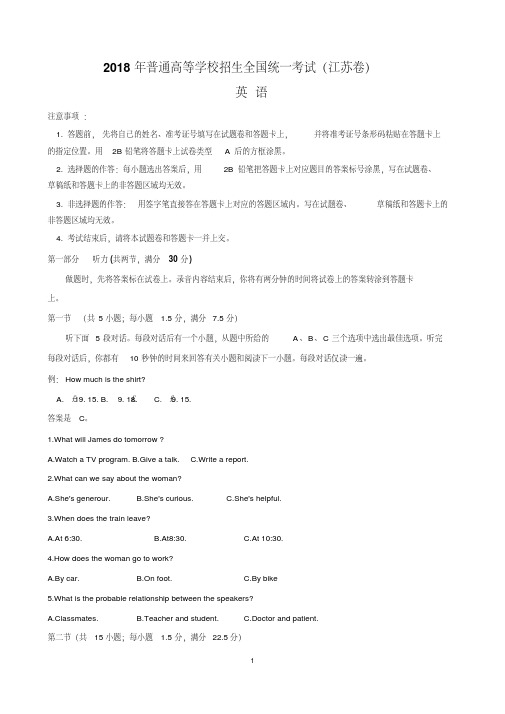
2018年普通高等学校招生全国统一考试(江苏卷)英语注意事项:1. 答题前,先将自己的姓名、准考证号填写在试题卷和答题卡上,并将准考证号条形码粘贴在答题卡上的指定位置。
用2B铅笔将答题卡上试卷类型A后的方框涂黑。
2. 选择题的作答:每小题选出答案后,用2B铅笔把答题卡上对应题目的答案标号涂黑,写在试题卷、草稿纸和答题卡上的非答题区域均无效。
3. 非选择题的作答:用签字笔直接答在答题卡上对应的答题区域内。
写在试题卷、草稿纸和答题卡上的非答题区域均无效。
4. 考试结束后,请将本试题卷和答题卡一并上交。
第一部分听力(共两节,满分30分)做题时,先将答案标在试卷上。
录音内容结束后,你将有两分钟的时间将试卷上的答案转涂到答题卡上。
第一节(共5小题;每小题 1.5分,满分7.5分)听下面5段对话。
每段对话后有一个小题,从题中所给的A、B、C三个选项中选出最佳选项。
听完每段对话后,你都有10秒钟的时间来回答有关小题和阅读下一小题。
每段对话仅读一遍。
例:How much is the shirt?9. 18. C. £ 9. 15.A. £ 19. 15.B. £答案是C。
1.What will James do tomorrow ?A.Watch a TV program.B.Give a talk.C.Write a report.2.What can we say about the woman?A.She's generour.B.She's curious.C.She's helpful.3.When does the train leave?A.At 6:30.B.At8:30.C.At 10:30.4.How does the woman go to work?A.By car.B.On foot.C.By bike5.What is the probable relationship between the speakers?A.Classmates.B.Teacher and student.C.Doctor and patient.第二节(共15小题;每小题 1.5分,满分22.5分)听下面5段对话或独白。
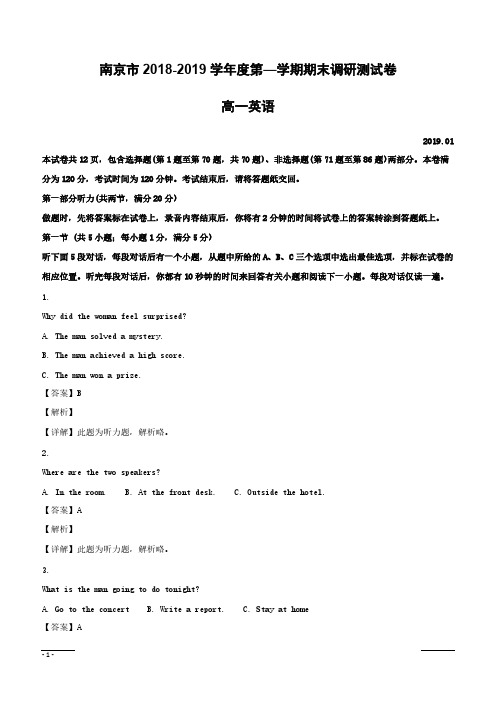
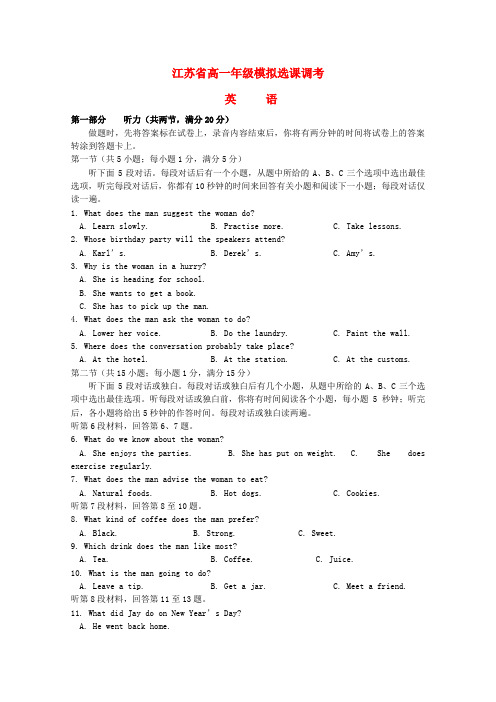
江苏省高一年级模拟选课调考英语第一部分听力(共两节,满分20分)做题时,先将答案标在试卷上,录音内容结束后,你将有两分钟的时间将试卷上的答案转涂到答题卡上。
第一节(共5小题;每小题1分,满分5分)听下面5段对话。
每段对话后有一个小题,从题中所给的A、B、C三个选项中选出最佳选项,听完每段对话后,你都有10秒钟的时间来回答有关小题和阅读下一小题;每段对话仅读一遍。
1. What does the man suggest the woman do?A. Learn slowly.B. Practise more.C. Take lessons.2. Whose birthday party will the speakers attend?A. Karl’s.B. Derek’s.C. Amy’s.3. Why is the woman in a hurry?A. She is heading for school.B. She wants to get a book.C. She has to pick up the man.4. What does the man ask the woman to do?A. Lower her voice.B. Do the laundry.C. Paint the wall.5. Where does the conversation probably take place?A. At the hotel.B. At the station.C. At the customs.第二节(共15小题;每小题1分,满分15分)听下面5段对话或独白。
每段对话或独白后有几个小题,从题中所给的A、B、C三个选项中选出最佳选项。
听每段对话或独白前,你将有时间阅读各个小题,每小题5秒钟;听完后,各小题将给出5秒钟的作答时间。
每段对话或独白读两遍。
听第6段材料,回答第6、7题。
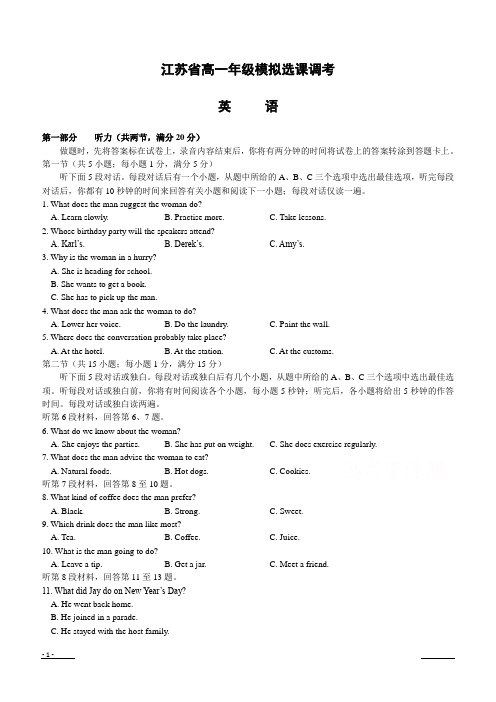
江苏省高一年级模拟选课调考英语第一部分听力(共两节,满分20分)做题时,先将答案标在试卷上,录音内容结束后,你将有两分钟的时间将试卷上的答案转涂到答题卡上。
第一节(共5小题;每小题1分,满分5分)听下面5段对话。
每段对话后有一个小题,从题中所给的A、B、C三个选项中选出最佳选项,听完每段对话后,你都有10秒钟的时间来回答有关小题和阅读下一小题;每段对话仅读一遍。
1. What does the man suggest the woman do?A. Learn slowly.B. Practise more.C. Take lessons.2. Whose birthday party will the speakers attend?A. Karl’s.B. Derek’s.C. Amy’s.3. Why is the woman in a hurry?A. She is heading for school.B. She wants to get a book.C. She has to pick up the man.4. What does the man ask the woman to do?A. Lower her voice.B. Do the laundry.C. Paint the wall.5. Where does the conversation probably take place?A. At the hotel.B. At the station.C. At the customs.第二节(共15小题;每小题1分,满分15分)听下面5段对话或独白。
每段对话或独白后有几个小题,从题中所给的A、B、C三个选项中选出最佳选项。
听每段对话或独白前,你将有时间阅读各个小题,每小题5秒钟;听完后,各小题将给出5秒钟的作答时间。
每段对话或独白读两遍。
听第6段材料,回答第6、7题。
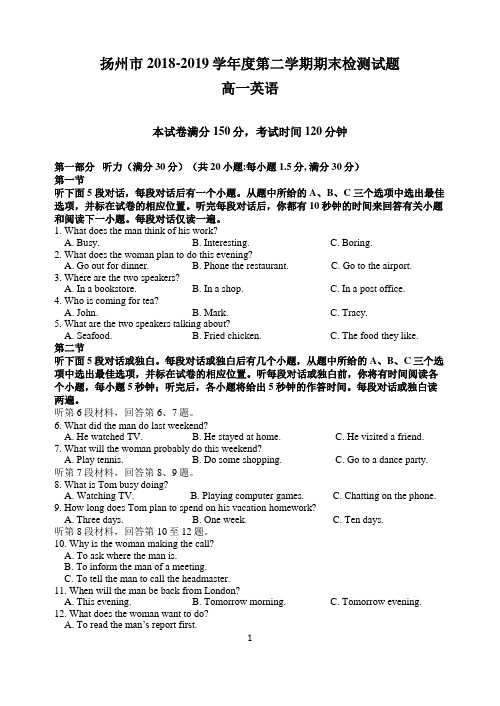
江苏省扬州市2018-2019学年高一英语下学期期末调研试题(含解析)本试卷满分150分,考试时间120分钟第一部分听力(满分30分)(共20小题:每小题1.5分, 满分30分)第一节听下面 5 段对话,每段对话后有一个小题。
从题中所给的 A、B、C 三个选项中选出最佳选项,并标在试卷的相应位置。
听完每段对话后,你都有10秒钟的时间来回答有关小题和阅读下一小题。
每段对话仅读一遍。
1.What does the man think of his work?A. Busy.B. Interesting.C. Boring.【答案】C【解析】【详解】W: Is there any position available in your office?M: My office? Doing the same work day after day! You think that would be interesting?2.What does the woman plan to do this evening?A. Go out for dinner.B. Phone the restaurant.C. Go to the airport.【答案】C【解析】【详解】M: If you’d like to go there for dinner this evening, I’ll phone the restaurant.W: Thank you, but I promised my sister I’d take her to the airport.3.Where are the two speakers?A. In a bookstore.B. In a shop.C. In a post office.【答案】C【解析】【详解】W: Good morning, Sir. What can I do for you?M: Good morning. How much is it to send this letter to the US?W: Three dollars.4.Who is coming for tea?A. John.B. Mark.C. Tracy.【答案】B【解析】【详解】W: John, is Mark coming for tea tomorrow?M: Yes, I told you yesterday, Tracy.W: Oh, did you? Sorry, I must have forgotten.5.What are the two speakers talking about?A. Seafood.B. Fried chicken.C. The food they like.【答案】C【解析】【详解】W: Do you like fried chicken?M: Yes, I like it very much. What about you?W: I don’t care much for chicken. I prefer seafood.M: But seafood is expensive, I should say.第二节听下面5段对话或独白。
2018—2019学年第一学期高三期初调研试卷英语2018. 9注意事项:1.本试卷分为第一卷(选择题)和第二卷(非选择題),满分120分。
考试时间120分钟。
2. 请将第一卷的答案填涂在答趙卡上,第二卷请直接在答題卡上规定的地方作答。
答题前,务必将自己的学校、、考试号等相关信息写在答题卡上规定的地方。
第I卷(选择题,共80分)第一部分:听力理解(共两节,满分15分)做题时,先将答案标在试卷上。
录音容结束后,你将有两分钟的时间将试卷上的答案转涂到答题卡上。
第一节(共5小题;每小题1分,满分5分)听下面5段对话。
每段对话后有一个小题,从题中所给的A、B、C三个选项中选出最佳选项,并在答题卡上将该项涂黑。
听完每段对话后,你都有10秒钟的时间来回答有关小题和阅读下一小题。
每段对话仅读一遍。
1. What is the most probable relationship between the two speakers?A. Salesman and customer.B. Boss and secretary.C. Doctor and patient.2. How many books did Mr. Robinson remend?A. 6.B. 8.C. 16.3. What do we know about Bill from the conversation?A. He is lazy.B. He is forgetful.C. He is fearless.4. What is the cause of their plaint?A. The heat.B. The lecture.C. The air quality.5. Why did the officer stop the woman?A. She was speeding.B. He thought she was in danger.C. She played the music so loud.第二节(共10小题;每小题1分,满分10分)听下面4段对话或独白。
江苏省高一年级模拟选课调考英语第一部分听力(共两节,满分20分)做题时,先将答案标在试卷上,录音内容结束后,你将有两分钟的时间将试卷上的答案转涂到答题卡上。
第一节(共5小题;每小题1分,满分5分)听下面5段对话。
每段对话后有一个小题,从题中所给的A、B、C三个选项中选出最佳选项,听完每段对话后,你都有10秒钟的时间来回答有关小题和阅读下一小题;每段对话仅读一遍。
1.What does the man suggest the woman do?A.Learn slowly.B.Practise more.C.Take lessons.2.Whose birthday party will the speakers attend?A.Karl’s.B.Derek’s.C.Amy’s.3.Why is the woman in a hurry?A.She is heading for school.B.She wants to get a book.C.She has to pick up the man.4.What does the man ask the woman to do?A.Lower her voice.B.Do the laundry.C.Paint the wall.5.Where does the conversation probably take place?A.At the hotel.B.At the station.C.At the customs.第二节(共15小题;每小题1分,满分15分)听下面5段对话或独白。
每段对话或独白后有几个小题,从题中所给的A、B、C三个选项中选出最佳选项。
听每段对话或独白前,你将有时间阅读各个小题,每小题5秒钟;听完后,各小题将给出5秒钟的作答时间。
每段对话或独白读两遍。
听第6段材料,回答第6、7题。
6.What do we know about the woman?A.She enjoys the parties.B.She has put on weight.C.She does exercise regularly.7.What does the man advise the woman to eat?A.Natural foods.B.Hot dogs.C.Cookies.听第7段材料,回答第8至10题。
绝密★启用前江苏省扬州市普通高中2018~2019学年高一下学期期末教学质量调研测试英语试题(解析版)2019年7月本试卷满分150分,考试时间120分钟第一部分听力(满分30分)(共20小题:每小题1.5分, 满分30分)第一节听下面 5 段对话,每段对话后有一个小题。
从题中所给的 A、B、C 三个选项中选出最佳选项,并标在试卷的相应位置。
听完每段对话后,你都有10秒钟的时间来回答有关小题和阅读下一小题。
每段对话仅读一遍。
1.What does the man think of his work?A. Busy.B. Interesting.C. Boring.【答案】C【解析】【详解】W: Is there any position available in your office?M: My office? Doing the same work day after day! You think that would be interesting?2.What does the woman plan to do this evening?A. Go out for dinner.B. Phone the restaurant.C. Go to the airport. 【答案】C【解析】【详解】M: If you’d like to go there for dinner this evening, I’ll phone the restaurant.W: Thank you, but I promised my sister I’d take her to the airport.3.Where are the two speakers?A. In a bookstore.B. In a shop.C. In a post office. 【答案】C【解析】【详解】W: Good morning, Sir. What can I do for you?M: Good morning. How much is it to send this letter to the US?W: Three dollars.4.Who is coming for tea?A. John.B. Mark.C. Tracy.【答案】B【解析】【详解】W: John, is Mark coming for tea tomorrow?M: Yes, I told you yesterday, Tracy.W: Oh, did you? Sorry, I must have forgotten.5.What are the two speakers talking about?A. Seafood.B. Fried chicken.C. The food they like.【答案】C【解析】【详解】W: Do you like fried chicken?M: Yes, I like it very much. What about you?W: I don’t care much for chicken. I prefer seafood.M: But seafood is expensive, I should say.第二节听下面5段对话或独白。
江苏省高一年级模拟选课调考英语第一部分听力(共两节,满分20分)做题时,先将答案标在试卷上,录音内容结束后,你将有两分钟的时间将试卷上的答案转涂到答题卡上。
第一节(共5小题;每小题1分,满分5分)听下面5段对话。
每段对话后有一个小题,从题中所给的A、B、C三个选项中选出最佳选项,听完每段对话后,你都有10秒钟的时间来回答有关小题和阅读下一小题;每段对话仅读一遍。
1. What does the man suggest the woman do?A. Learn slowly.B. Practise more.C. Take lessons.2. Whose birthday party will the speakers attend?A. Karl’s.B. Derek’s.C. Amy’s.3. Why is the woman in a hurry?A. She is heading for school.B. She wants to get a book.C. She has to pick up the man.4. What does the man ask the woman to do?A. Lower her voice.B. Do the laundry.C. Paint the wall.5. Where does the conversation probably take place?A. At the hotel.B. At the station.C. At the customs.第二节(共15小题;每小题1分,满分15分)听下面5段对话或独白。
每段对话或独白后有几个小题,从题中所给的A、B、C三个选项中选出最佳选项。
听每段对话或独白前,你将有时间阅读各个小题,每小题5秒钟;听完后,各小题将给出5秒钟的作答时间。
每段对话或独白读两遍。
听第6段材料,回答第6、7题。
6. What do we know about the woman?A. She enjoys the parties.B. She has put on weight.C. She does exercise regularly.7. What does the man advise the woman to eat?A. Natural foods.B. Hot dogs.C. Cookies.听第7段材料,回答第8至10题。
8. What kind of coffee does the man prefer?A. Black.B. Strong.C. Sweet.9. Which drink does the man like most?A. Tea.B. Coffee.C. Juice.10. What is the man going to do?A. Leave a tip.B. Get a jar.C. Meet a friend.听第8段材料,回答第11至13题。
11. What did Jay do on New Year’s Day?A. He went back home.B. He joined in a parade.C. He stayed with the host family.12. When is the Rose Parade usually held?A. On January 1st.B. On New Year’s Eve.C. Every Sunday.13. What are the speakers mainly talking about?A. Pop bands.B. Sports events.C. New Year celebrations.听第9段材料,回答第14至16题。
14. What is the probable relationship between the speakers?A. Classmates.B. Colleagues.C. Teacher and student.15. When will the woman get the result of the in-person interview?A. A few months later.B. In less than a month.C. After graduation.16. What does the man plan to do?A. Focus on his studies.B. Attend job interviews.C. Look for solutions.听第10段材料,回答第17至20题。
17. Who founded the British Museum?A. Sir Hans Sloane.B. King George II.C. The UK government.18. What can we learn about the museum?A. It is round.B. It is totally free.C. It has global collections.19. Where is the Easter Island Statue exhibited?A. In Room4.B. In Room24.C. In Room 40.20. Who is Neil?A. A travel guide.B. A tourist.C. A program host.第二部分阅读理解(共两节,满分40分)第一节(共15小题;每小题2分,满分30分)阅读下列短文,从每题所给的A、B、C和D四个选项中,选出最佳选项。
ASeattle summer camps from Pacific Science Center, our Camps for Curious Minds provide theperfect opportunity to explore, experiment and discover. Our exciting and enriching camps offer kidsin grades PreK-8 hands-on science experiments, fun and challenging projects, and unique and newlearning experiences that create lifelong memories and inspire the inner scientist in your child.Registration(注册)All registrations must be made online with full Visa or MasterCard payment. You must registerone child at a time. Once you have registered your first child, you will see the “add anoth button, allowing you to choose camps for a second child. Registrations require full payment at thetime of registration.Cancellations(取消)Requests for withdrawal must be received at least 2 weeks before camp start date. Forweek-long camps, a $ 100 processing fee will be charged per camp. For 2-day camps, 50% of thecost will be charged. No refunds(退款)given within 2 weeks of the camp start date.Kid CodeAt pick-up you will be asked the Kid Code you selected at registration. This code functions as apassword; share this code only with anyone authorized to pick up your child. If you forget your KidCode at pick-up, you must park and walk to camp staff to show photo identification.21. What do Seattle summer camps provide for kids?A. Make new inventions.B. Do scientific research.C. Learn some medical courses.D. Perform science experiments.22. How do you register for your children?A. Signing up in turn.B. Registering on the spot.C. Paying half online.D. Using a kid code.23. If you want to cancel a 7-day camp a month before camp start date, you will pay _______.A. $ 200.B. $ 100.C. $ 50.D. None.BA recent study has found that being exposed to low temperatures creates more good fat which burns calories in the body. Being cold imitates the effects of exercise, protecting against obesity and improving health. The researchers have discovered that exposure to cold changes the make-up of gut bacteria, which can lead to fat-burning, improve glucose metabolism, and reduce body weight.While ordinary white fat, known as bad fat, piles on when we eat more calories than we burn, brown fat seems to burn extra calories to produce heat. Babies have lots of brown fat — they need it to keep warm — but there are small amounts in the necks of adults, too. Studies have shown that staying in a cold environment can accelerate the formation of more brown fat in the body.Researchers predict the health benefits of being exposed to cold may be linked to gut bacteria. They exposed the first group of mice to cold temperature of 6 ℃for up to 10 days and discovered this caused a major shift in the make-up of the mice’s gut microbes, preventing the mice from gaining weight.Then, the gut bacteria were transplanted into the second group of mice that did not have the gut microbes. It was found that they improved glucose metabolism and increased tolerance to cold temperatures. The mice also lost weight as the changes in gut bacteria promoted the formation of brown fat. However, after three weeks of cold exposure, the body weight began to remain stable.Professor Mirko Trajkovski of the University of Geneva claims that they provide powerful evidence that gut microbes play a key role in people's ability to adapt to the environment. They are excited about testing whether targeting gut microbes could be a promising approach for preventing obesity and related conditions.24. What's the new finding of a recent study?A. Good fat has nothing to do with calories.B. Exercise can make people become fat.C. Being cold helps people lose weight.D. Gut bacteria will stop glucose metabolism.25. What do we know about the brown fat?A. It's usually considered as bad fat.B. It will fail to produce in cold bodies.C. It can't be found in the bodies of adults.D. It burns more calories in low temperatures.26. With the gut bacteria, the second group of mice _______.A. kept losing weight continuallyB. had much less brown fat in the coldC. gained better ability to stand the coldD. produced more gut microbes in the body27. According to Mirko Trajkovski, the findings _______.A. could provide new treatment for overweight peopleB. show people how to get used to the coldC. remind people of the importance of keeping warmD. may cause more people to take exerciseCBritish parents encourage their children to play musical instruments as part of a family traditionand not to raise their social status as Americans do, research says.Dr. Aaron Reeves of the University of Oxford found that UK parents did not see musicalachievement by their children as character building or useful in getting university places or jobs.Instead, it was usually only those parents who played instruments that encouraged their children tofollow suit.-class This contrasted with research carried out by other academics in America, he said. “Mid parents in the US appear to associate cultural practice with other benefits, such as developingspecific characteristics and paving the way for educational success. Middle-class families are oftenmarked by a pattern of ‘concerted cultivation’, where parents organize music-centred activities fortheir children, often in addition to school-based musical practice.”Researchers had owed this to “parental anxiety over the declining fortunes of educatedAmericans. These parents have become increasingly worried about providing their children withskills and abilities enabling them to stand out from their competitors in the job market.”By contrast, for British respondents, no such connection was made between what is consideredas an overbearing parenting style and future educational or career possibilities. The parentsinterviewed here did not connect music with usefulness but rather they focused on the value of musicas a family tradition and, to a lesser extent, as something valuable in its own right.One Scottish parent, a chemist by profession, said during the interviews, “We’ve got twolearning musical instruments. If we think it’s maybe worthwhile we try and encourage them, but we wouldn't force them.” A housewife said, “My son’s just turned five and I want him to do the guitar because his uncle does i t, but it’s up to him.”In some UK families, said Dr. Reeves, music was even “believed t o be an obstacle toeducational success, or at least secondary to it.”28. What do British parents think of music learning?A. Worthwhile as a family tradition.B. Helpful for character building.C. Beneficial to further education.D. Useful for job application.29. What does the underlined word “this” in Paragraph 4 refer to?A. Cultural practice.B. Educational success.C. Concerted cultivation.D. School-based musical practice.30. What can be inferred from the text?A. The future of American kids is not promising.B. Music learning is a personal choice for British kids.C. American parents hardly link music with success.D. British parents show little concern about education.31. What is the text mainly about?A. Reasons for British music preference.B. Differences between British and American parents.C. Americans’ attitude towards music learning.D. British parenting style in music education.DWe traveled to Moscow for a river cruise. I had never been to Russia and my impressions ofthat country were formed by what I heard and saw on television and the newspaper. We were to bemet at the airport by a driver who would then take us to the hotel as we decided to see Moscowbefore the cruise. We arrived on time, got our baggage and went to the gate, but no one was waitingand holding a sign with our names.We had the phone number of the driver and travel agency but no phone that would work in Russia. I noticed a young woman sitting next to me with a cell phone so I asked her if she spokeEnglish and she replied "yes”. Would she please call our driver, I would pay for the call. I asked, "No problem," she replied and called both numbers but no one answered.A Russian woman holding a sign with someone's name on it, not ours, must have overheard this conversation and took the paper and called both numbers. Again, no one answered. She shruggedand sat down then her phone rang and in Russian she had a conversation.Then she started to tell me about the call, but in Russian. I said, "No Russian, English?" Shesaid, "No English. Russian and Spanish." The young woman who had made the first call said shespoke Spanish. So the Russian woman relayed the information from our driver to the young womanin Spanish. Then the young woman told the information to me in English.The three of us looked at each other and realized what had just happened and laughed and hugged each other.32. We were supposed to be met by _______.A. a travel agentB. a Russian womanC. a driverD. no one33. How many people called the driver in the passage?A. 1.B. 2.C. 3.D. 4.34. In which order was the message translated to the writer?A. Spanish—Russian—English.B. Spanish—English—Russian.C. Russian—English—Spanish.D. Russian—Spanish—English.35. What may be the best title for the passage?A. Translated kindness.B. Travelling in Russia.C. An usual call.D. Kind people in Russia.第二节(共5小题;每小题2分,满分10分)根据短文内容,从短文后的选项中选出能填入空白处的最佳选项。